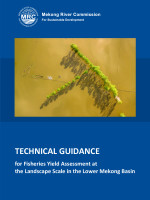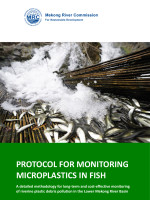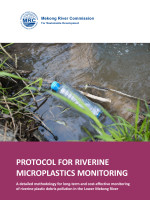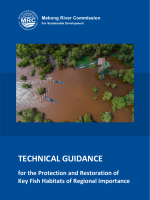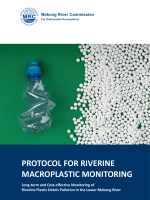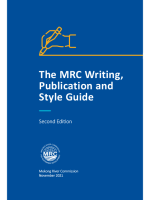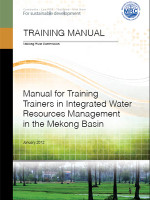Manuals
Technical guidance for fisheries yield assessment at the landscape scale in the Lower Mekong River Basin
The Technical Guidance aims to establish a systematic framework for generating, acquiring, and analyzing data using GIS in order to estimate the yield of fish and other aquatic animals (OAAs) from the Lower Mekong Basin. This approach, which is based on catch data from fishers, provides a novel method to determine the yield per unit of habitat area and extrapolate catch data from the Basin. By doing so, it offers increased certainty to all stakeholders involved in joint fisheries initiatives, particularly in transboundary areas, by clarifying roles and responsibilities. In addition, the document outlines quality control procedures for ensuring the reliability of the data, including fish catch verification, data validation, and method calibration.
Download | DOI: 10.52107/mrc.bgu8bl | Published on: 06 Feb 2024 | Language: English
Protocol for Microplastic Monitoring in Fish
A detailed methodology for long-term and cost-effective monitoring of riverine plastic debris pollution in the Lower Mekong River Basin
With a recent study identified the Mekong River as one of ten rivers to contribute over 90% of plastic debris to the world’s marine environment, there is an urgent need for a reliable data and information on riverine plastic debris pollution and their impacts to the aquatic environment of Mekong River. This Protocol for Monitoring Microplastic in Fihs has been developed and finalized as one of three protocols of the MRC’s Detailed Methodology for the Long-term and Cost-effective Monitoring of Riverine Plastic Debris Pollution in the Lower Mekong River Basin (LMB). The finalization of the detailed methodology was made possible through the concerted efforts and commitment of the MRC Member Countries and support of experts at national, regional and global levels, and included rigorous processes of consultations, capacity building, and piloting to ensure that the methodology is adapted to the situation of the LMB. The methodology aims to provide the much-needed data and information for an improved knowledge and understanding on the pathway and behaviors of plastic debris pollution in the LMB, from land-based sources to riverine environment, and ultimately to the marine environment. Information derived from the long-term implementation of methodology can be used to assess the effectiveness of plastic waste management the LMB.
Download | DOI: 10.52107/mrc.bhv7va | Published on: 19 Jan 2024 | Language: English
Protocol for Riverine Microplastics Monitoring
A detailed methodology for long-term and cost-effective monitoring of riverine plastic debris pollution in the Lower Mekong River
With a recent study identified the Mekong River as one of ten rivers to contribute over 90% of plastic debris to the world’s marine environment, there is an urgent need for a reliable data and information on riverine plastic debris pollution and their impacts to the aquatic environment of Mekong River. This Protocol for Riverine Microplastic Monitoring has been developed and finalized as one of three protocols of the MRC’s Detailed Methodology for the Long-term and Cost-effective Monitoring of Riverine Plastic Debris Pollution in the Lower Mekong River Basin (LMB). The finalization of the detailed methodology was made possible through the concerted efforts and commitment of the MRC Member Countries and support of experts at national, regional and global levels, and included rigorous processes of consultations, capacity building, and piloting to ensure that the methodology is adapted to the situation of the LMB. The methodology aims to provide the much-needed data and information for an improved knowledge and understanding on the pathway and behaviors of plastic debris pollution in the LMB, from land-based sources to riverine environment, and ultimately to the marine environment. Information derived from the long-term implementation of methodology can be used to assess the effectiveness of plastic waste management the LMB.
Download | DOI: 10.52107/mrc.bh5hvu | Published on: 19 Jan 2024 | Language: English
Technical Guidance for the Protection and Restoration of Key Fish Habitats of Regional Importance
The fisheries resources of the Lower Mekong Basin are under considerable pressure from rapid economic development. Consequently, Technical guidance for the protection, restoration and improvement of key fish habitats of regional importance has been developed. The Technical Guidance is process-driven and identifies different levels of information, data collection and actions required to improve the conservation and sustainability of fish species, populations, communities, as well as other aquatic animals, in the LMB. The Technical Guidance adopts the Drivers–Pressures –State –Impact–Response (DPSIR) approach to identify the main threats to fisheries, and design, implement and monitor the most appropriate actions.
Download | DOI: 10.52107/mrc.bgs0ox | Published on: 28 Dec 2023 | Language: English
Protocol for Riverine Macroplastic Monitoring
Long-term and Cost-effective Monitoring of Riverine Plastic Debris Pollution in the Lower Mekong River
With a recent study identified the Mekong River as one of ten rivers to contribute over 90% of plastic debris to the world’s marine environment, there is an urgent need for a reliable data and information on riverine plastic debris pollution and their impacts to the aquatic environment of Mekong River. This Riverine Macroplastic Monitoring Protocol has been developed and finalized as one of three protocols of the MRC’s Detailed Methodology for the Long-term and Cost-effective Monitoring of Riverine Plastic Debris Pollution in the Lower Mekong River Basin (LMB). The finalization of the detailed methodology was made possible through the concerted efforts and commitment of the MRC Member Countries and support of experts at national, regional and global levels, and included rigorous processes of consultations, capacity building, and piloting to ensure that the methodology is adapted to the situation of the LMB. The methodology aims to provide the much-needed data and information for an improved knowledge and understanding on the pathway and behaviors of plastic debris pollution in the LMB, from land-based sources to riverine environment, and ultimately to the marine environment. Information derived from the long-term implementation of methodology can be used to assess the effectiveness of plastic waste management the LMB.
Download | DOI: 10.52107/mrc.bflvfj | Published on: 01 Dec 2023 | Language: English
The MRC Writing, Publication and Style Guide
The MRC Writing, Publication and Style Guide contains guidance on common problems of English grammar, spelling, hyphenation, capitalization, document referencing, in-text citations, and bibliography organization. First published in 2007, this second edition of the Guide is intended for creators of MRC’s documents and publications, including MRC Secretariat’s staff members and consultants as well as external users who need a style guide.
Download | DOI: 10.52107/mrc.qx5yo4 | Published on: 12 Nov 2021 | Language: English
Manual for Training Trainers in Integrated Water Resources Management in the Mekong Basin
The manual seeks to provide knowledge of and training in integrated water resources management (IWRM). It is designed to be adapted to riparian languages and are used for national training courses.
Download | DOI: 10.52107/mrc.ajgt43 | Published on: 01 Jan 2012 | Language: English
